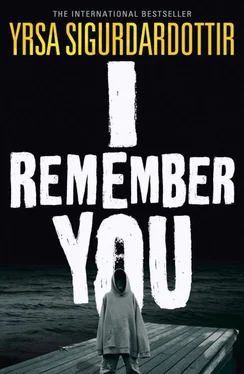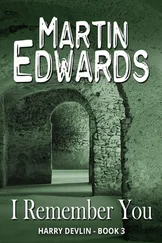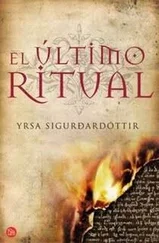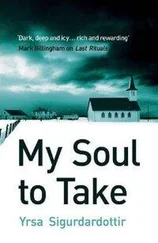The boat had ended up in Hesteyri and when the man left it to do whatever it was he needed to do there, which was never clear to the boy, he decided to sneak ashore and fetch the crosses from the grave of his mother and brother, show those bastard kids that they were wrong. While he was busy pulling them out, the boat had sailed away and left him behind, alone in the abandoned village where he used to live. In the winter, in a place almost no one ever came to.
For a long time he held out hope that someone would come and get him; that one of the kids who’d watched him sail away would let someone know and that the police would find out where the boat had sailed and come to find him. He lived on the contents of shells from the beach, since he had no fishing gear and didn’t know how to make any. He’d gone to stay in his old home, not daring to break into any other house for fear of getting into trouble when they came to fetch him. As the cold got more and more severe he was forced to seek shelter in the crawl space, where it was warmest, but it was all for nothing. The cold found him and didn’t let go until he was dead. Naturally, there was no description of this, but his description of the fingers of his left hand turning black indicated that the boy had suffered from frostbite; without medical assistance, septicaemia and death generally followed shortly afterwards, as the empty pages following the description strongly suggested.
‘Why wasn’t he found sooner?’ Úrsúla’s voice was broken and hoarse; it had been a long time since she’d spoken for so long or so much to another person. It was as if a heavy burden had been lifted from her shoulders. Perhaps she meant: What if he’d been found thirty years ago? Or forty? Would I have had a more normal life then?
‘The house was empty, no one stepped through its door for the next few decades. From what I understand, some people who came there one autumn to secure their own houses for the winter decided to board up its windows and doors, but it wasn’t until three years ago that anyone lived in it even for a short time. The man who went there to renovate it probably couldn’t see very well since he laid a parquet floor over the hatch, nearly ensuring that the boy would be hidden from the world for much, much longer.’
‘He broke into the school the night that he died. Revenge from beyond the grave. Then I knew he was dead, because that’s when he appeared to me for the first time. Ever since then I’ve been seeing him. And hearing him.’ She looked into Freyr’s eyes and seemed surprised not to find in them the same disbelief she must often have met with over the years. ‘But now he’s gone and he won’t be back. Maybe he wanted to be found.’
‘Maybe.’ For the first time since he’d started treating her, Freyr didn’t feel like interrupting the woman’s story, which was finally making sense. If, and only if, this extraordinary explanation for the first break-in were true, was it the same dead boy who had gone berserk in the preschool? And why? If Freyr gave his imagination free rein for a second, he might conclude that the break-in was connected to the arrival of the trio at the house in Hesteyri, but there was no point pondering this. The mystery would probably never be solved. Neither would the question of whether Bernódus had pushed to have Benni found in the hope that his own remains would be discovered in the search, and that he would gain the peace he had so long desired. In any case, it was a satisfactory ending to a great tragedy. With the exception of Úrsúla, everyone who had hurt Bernódus was now dead and there were no longer any ties binding the boy to this world. Freyr allowed himself the faint hope that this dark night was now at an end.
‘I’m tired.’ Úrsúla closed her eyes. ‘I think I’ll sleep well tonight.’ She rested her head on her pillow, facing away from Freyr. ‘Won’t that be strange?’
Like so many things. Freyr said goodbye and left. He was too tired, sad and distracted to pay any attention to the low giggle that came from the room after he shut the door.
Freyr drove away from the nursing home, his window wide open. The cold winter air invigorated him a little. He knew the boat bringing Benni home was expected shortly, and he wanted to be waiting for it on the pier. He might very well have to hang around in the car, but that was all right; nothing was more important to him just then. He drove down to the harbour and angled his seat back to make himself comfortable. Then he looked out over the sea and hoped that the black spot against the sky at the horizon was the boat, even though it was bringing him final confirmation that all hope was gone. Once all the formalities had been taken care of, there wouldn’t be too much to think about. Work, eat and sleep were the only things he could come up with, apart from possibly taking care of the dog, who no one seemed to want to claim and whose name might be either Patti or Hvutti. It seemed to respond to both.
Maybe he would go on a long holiday; take some unpaid leave and settle down far from everything, both people and civilization. He thought of the house in Hesteyri, watched by all the people who’d drowned in the nearby fjord over the years. Maybe he could acquire it cheaply. The owners were either dead or gone and it would give him something to think about; he could try to get it back into a decent state and maybe then the negative aura that seemed to surround it would disperse.
He watched the boat as it approached. Surprisingly, the sea was mirror-smooth, as if in honour of Benni. A warm tear ran down his cheek. With it, the sharpest of the pain seemed to leave his soul, and he felt a bit better. He resolved to make it happen, this thing with the house. He could bring the dog with him and even invite Dagný to come along; her or the nurse who resembled Líf, though only in appearance. Maybe Sara would also like to see the place eventually, and could make her peace with it and with life. Her tears when he had told her the news had sounded like the right kind; the healthy grieving process had finally begun. Although they would never be married again, it was possible that they might become friends once more, and perhaps Hesteyri was the perfect place for him to go for a more peaceful, happier life. Maybe that could be the one good thing that came out of all this. They had beautiful, bittersweet memories of Benni that could never be taken from them and if Sara visited him there they could remember him together, calmly, in between arguing and resurrecting all their old issues. One thing was certain, it would do them both some good.
He decided to buy the house and get it back into shape.
Katrín had watched the waves rock the boat out in the fjord as she stood at the top of the beach, unnoticed by anyone. She felt a bit odd, as if she were drunk – not very drunk, just a bit light-headed, and as though everything was suddenly very simple. Water dripped from her clothing onto the snow-covered ground, its trail following her past the doctor’s residence, over the bridge and in the direction of the house, her house. There was a rustling sound and the dry, yellowed undergrowth cracked behind her, but she ignored it. Nothing else mattered now except the anger that boiled deep inside her. This was her home and nothing would disturb her here again. She would make sure of it.
Also by Yrsa Sigurdardóttir
Last Rituals
My Soul to Take
Ashes to Dust
The Day is Dark
Yrsa Sigurdardóttir works as a civil engineer in Reykjavik. I Remember You is her fifth adult novel.
Philip Roughton is a highly respected translator of Icelandic literature, having translated works by the Nobel Prize winner Halldór Laxness, among others. He lives in Reykjavik.
Читать дальше










